Blog
A Refugee Family’s Long Resettlement Journey
For refugees seeking to rebuild their lives, their journey to the United States can be long and fraught with challenges. While the average time it takes for a refugee to be vetted and screened to come to the U.S. is about two years, many people leave their homes long before. UNHCR reports that some refugees who flee crises in their home country end up living in refugee camps for years or even decades. However, the vast majority of refugees live in cities, where they may live in limbo for 10 to 26 years, often with limited job and educational opportunities. Nobody wants to become a refugee. And most hope and pray to return to their home country someday.
When that’s not possible, it’s important that countries like the United States welcome refugees and provide a way for them to rebuild their lives permanently. But while their arrival in the U.S. is a cause of celebration, refugees have not yet reached the end of their journey. Coming to the U.S. sets refugees down a new road full of obstacles and barriers they must overcome in order to thrive in their new country.
World Relief’s job is to help the community be a place of welcome for refugees so that they can overcome these challenges and truly celebrate belonging and making a new home. Learn more about how you can walk this path with new arrivals by going on the journey of a refugee family below.
First Day of a Refugee Journey in the U.S.
Behind the Scenes

Even before a refugee family arrives, World Relief staff and volunteers from a local church or community group begin preparation for their arrival. Together, they move furniture and essentials into an apartment so that the family has what they need to feel comfortable and at home. By the time a refugee family arrives, they will have a home equipped with beds, a kitchen table, chairs, a couch, other furniture, and kitchen utensils. Volunteers like you also stock the pantry with familiar foods, coffee or tea, and cooking essentials. This helps provide a safe and welcoming place for a family to rest after their travels.
Arrival
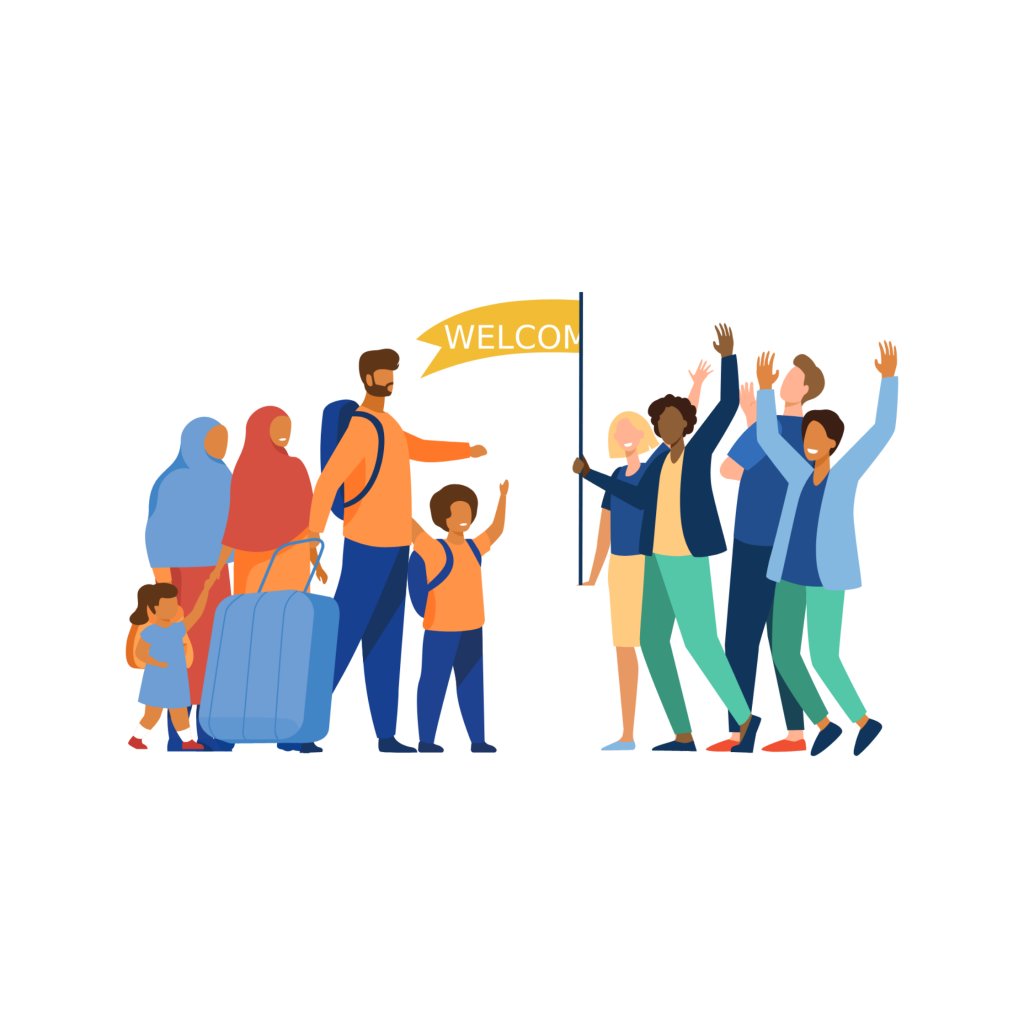
When a family or individual arrives to the United States, they often bring with them hopes and big dreams for the future. They are still mourning the lives and loved ones they left behind, but they also have expectations and goals for life in the U.S. From the time their plane lands at the airport, World Relief staff and people like you are there to welcome them and drive them to their new home.
First Week
Orientation to the U.S.
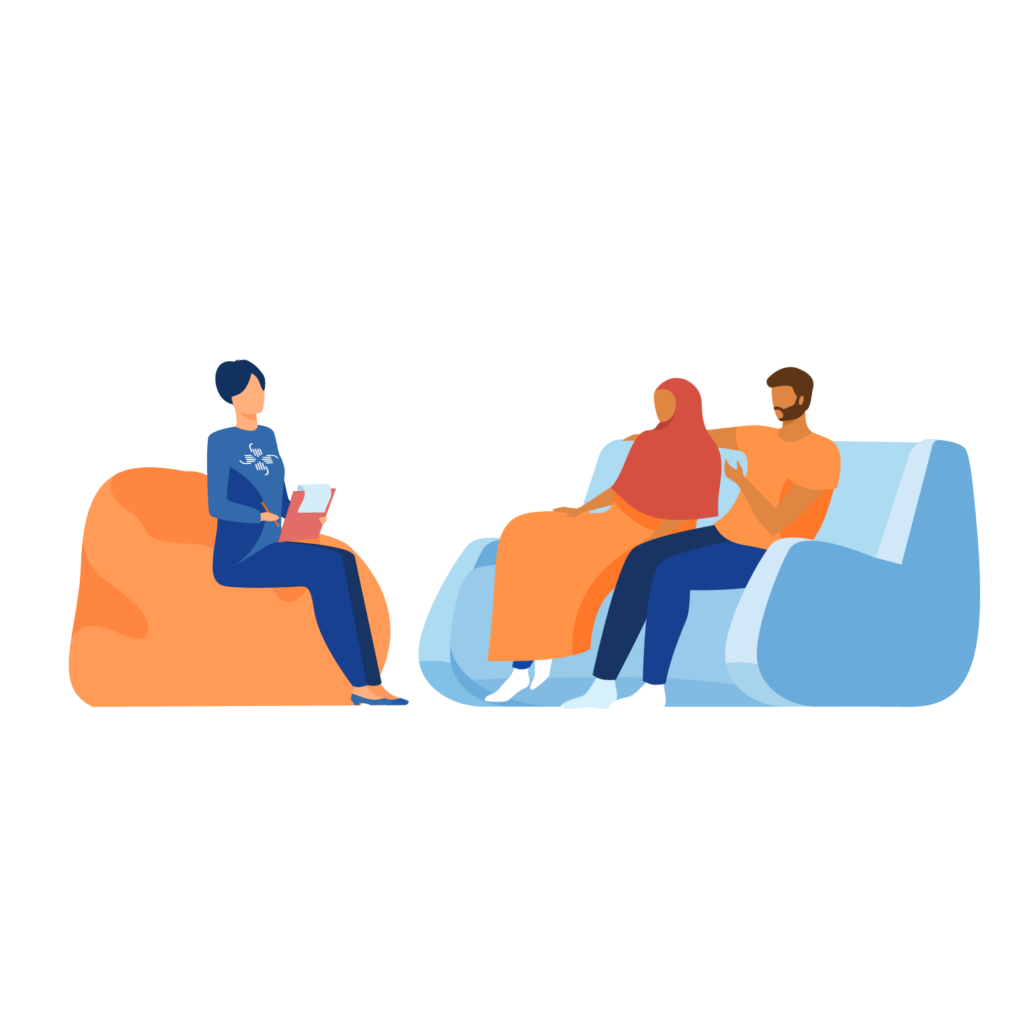
After a few days, the family sits down with World Relief staff and a Good Neighbor Team, a group of committed volunteers from the community who commit to supporting the family for the next six months. Together, they create an action plan to guide the family for the upcoming weeks as they settle in. The family and volunteers share with the family about the community and things they need to know.
First Month
Adjusting to the New Community
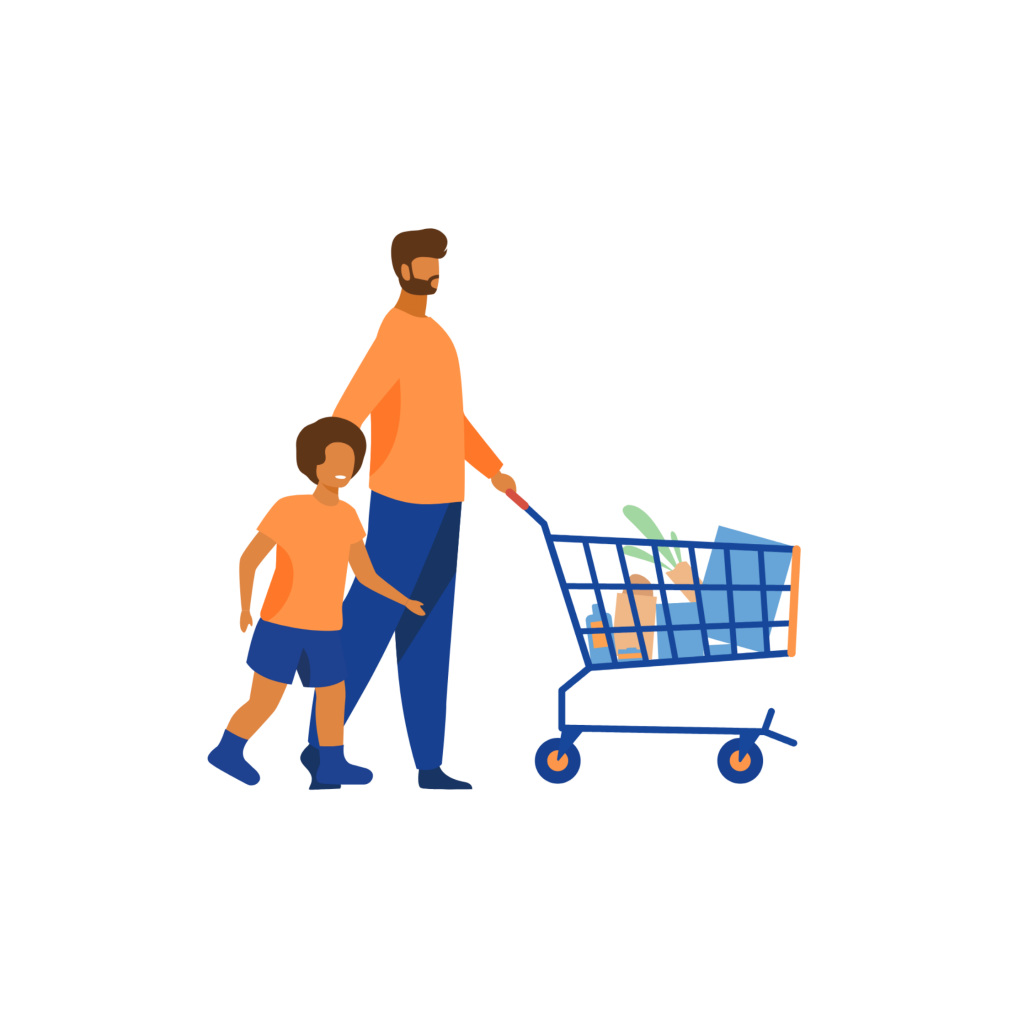
For the next few weeks, the family stays busy. There are errands to run. Doctors appointments to go to. Lots of paperwork. And there are many little tasks to do…everything from applying for social security cards to enrolling children in school.
First Three Months
Support for Children and Youth
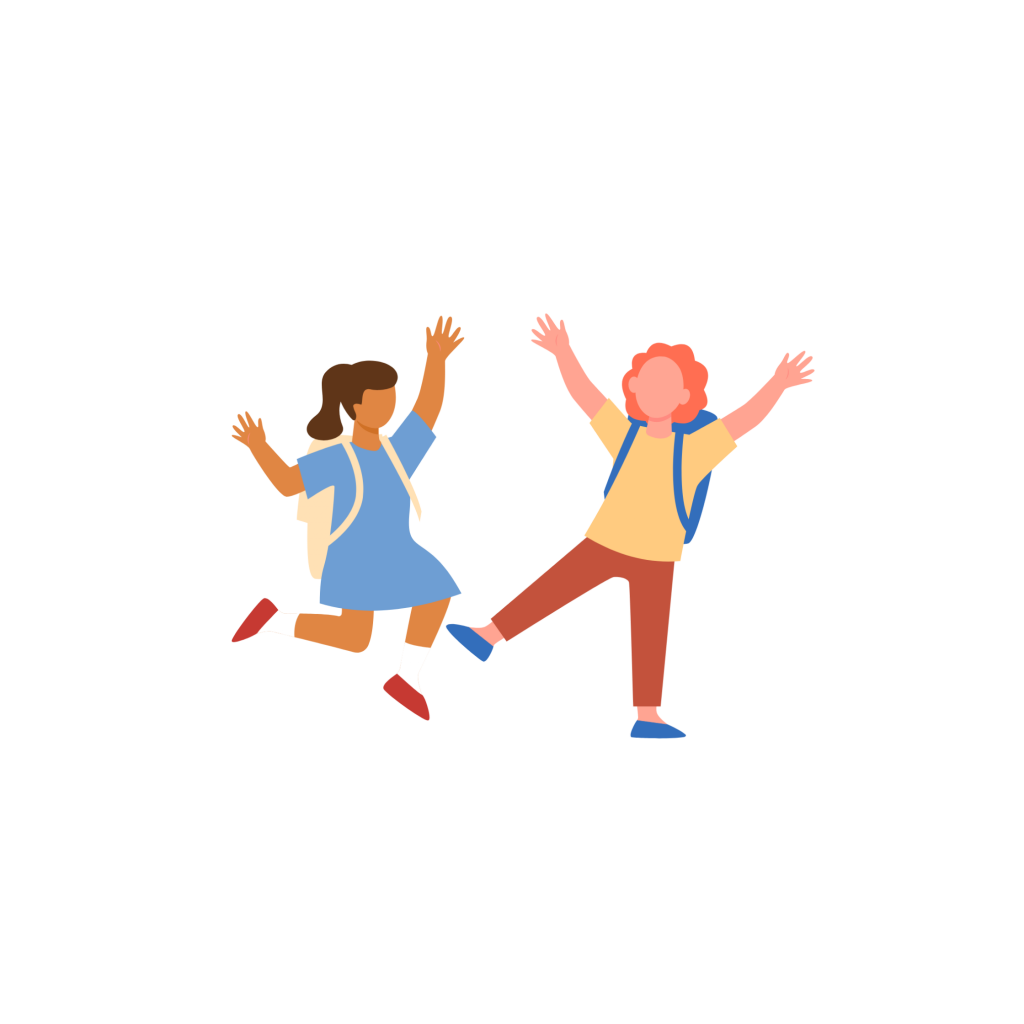
As the family adjusts, the kids get to participate in World Relief’s after-school clubs. There, they get homework help, play games, and meet other children. Social-emotional learning (SEL) activities help the children and youth process their emotions and build self-confidence. They learn and play alongside other children and practice important life skills like relationship-building and conflict resolution. And they get academic support from people like you so they can succeed in school!
Learning English
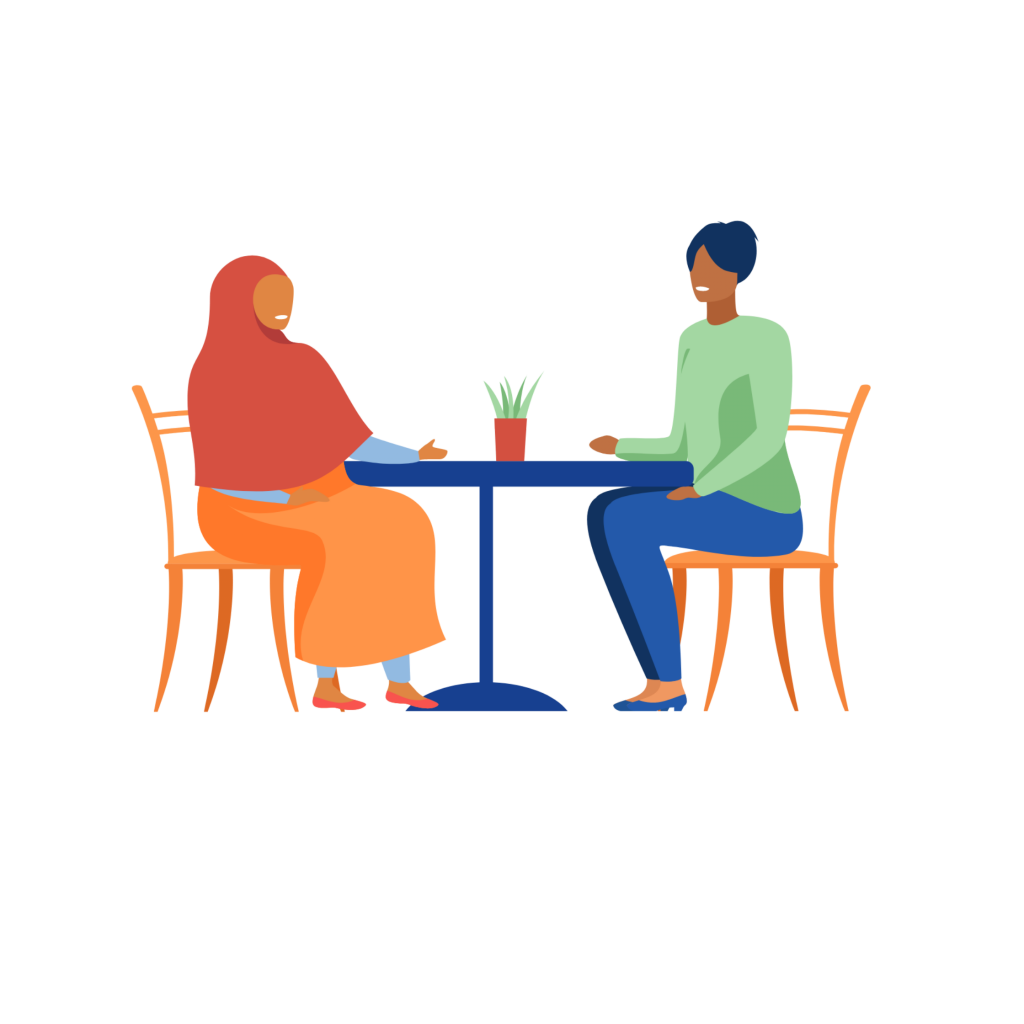
The parents join English classes. There, World Relief teachers, volunteers, and other English learners come together to practice their skills speaking. The family checks out an iPad from the technology lending library, which they use to do English homework and join classes on Zoom. Conversation cafes give language learners the chance to practice their conversational English by talking with community volunteers like you.
Starting New Jobs
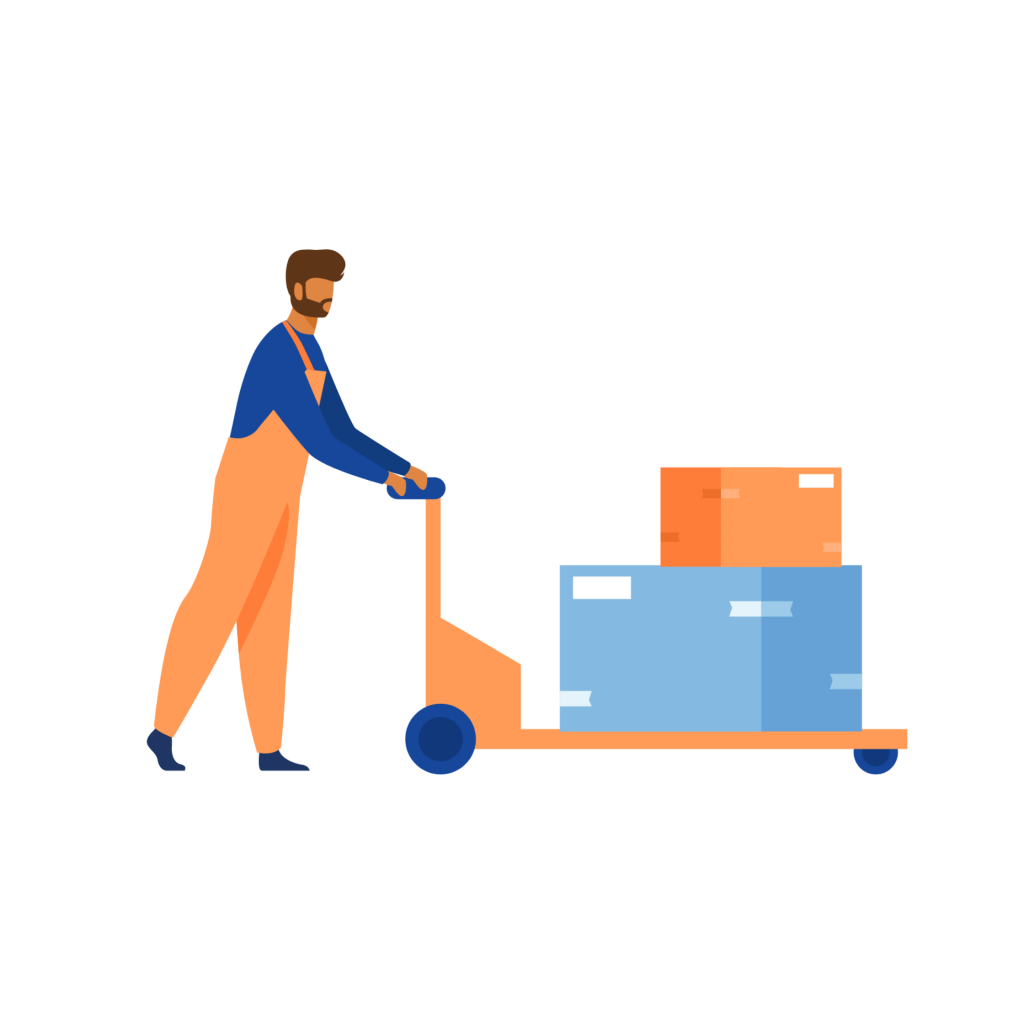
Local business partners help the parents start new jobs, and World Relief’s Employment Services team helps them prepare for their new roles and start work. Later on, the Refugee Career Pathways team will help them brainstorm their long-term career goals and develop job skills.
First Year
Immigration Processes
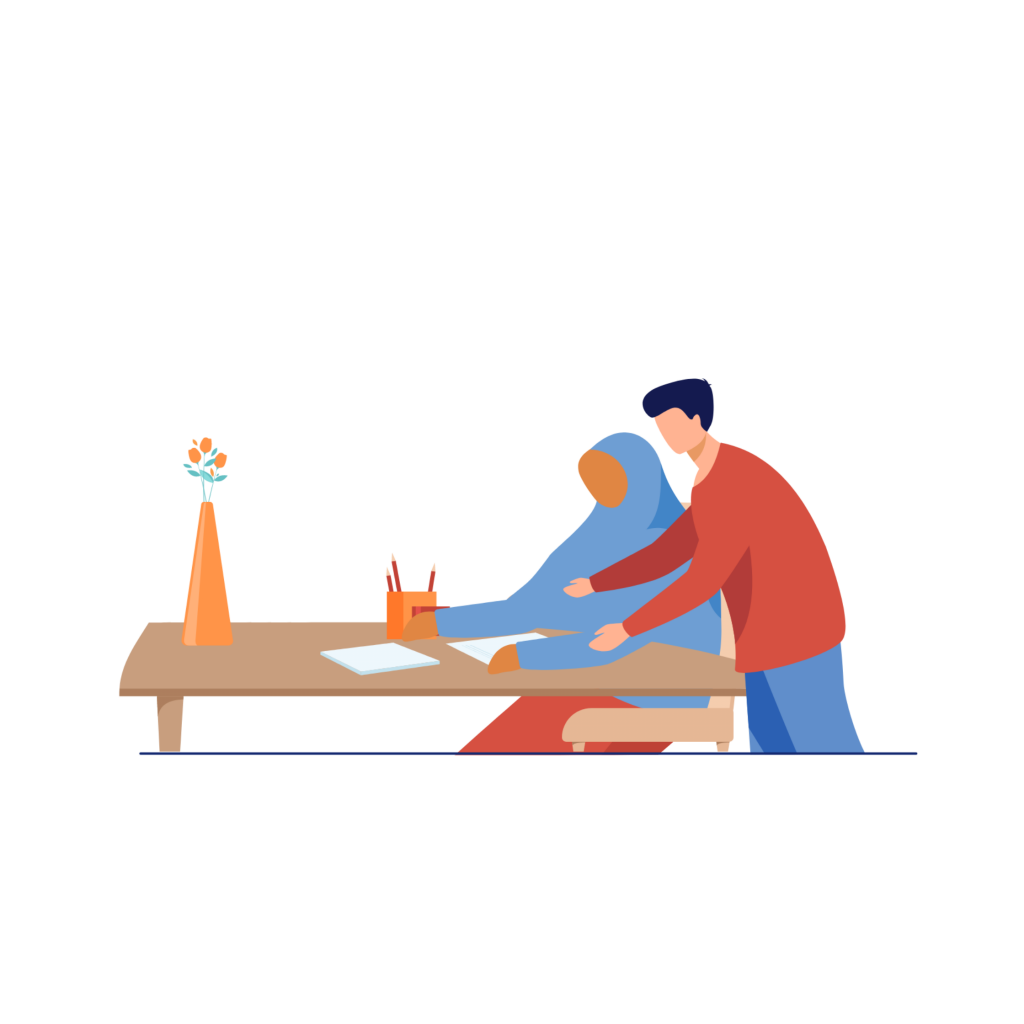
Eventually, the family will apply for Green Cards so they can stay in the U.S. permanently. They gain the help of a World Relief staff attorney who helps them take this important next step – gathering documentation, filing paperwork, and completing all necessary steps. With affordable, qualified legal help and interpretation, the family does not have to worry about their legal pathway to become permanent residents or citizens.
First Five Years
Community Engagement
After a few years, Mom Sarya gets involved in the community. She joins a parent committee at her daughter Jamila’s school. Along with the other parents, she gets to support her daughter’s teachers and help create a welcoming environment for all students.
Saving for Long-Term Goals
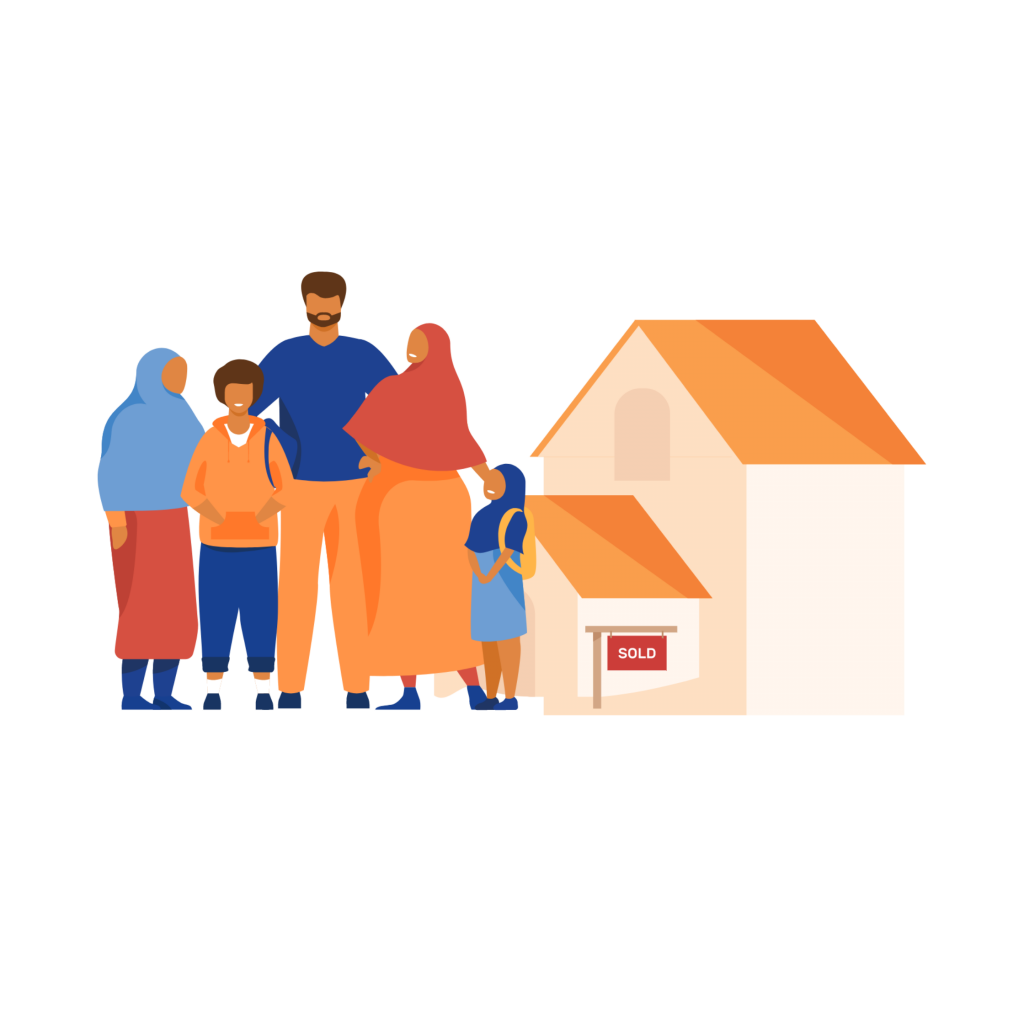
When the Ahmadi family joins the World Relief’s financial literacy program, they start learning how to manage money. They learn about debt, credit, and banking. Eventually, they join a match savings program and start saving money for a home. After a few years of diligent savings, they reach $4,000 and a partner matches their money dollar-for-dollar! They end up with a total of $8,000 – enough for a down payment on a house! Buying a home is a proud accomplishment for the family and a testament to their hard work.
Five Years and Beyond
Reaching Milestones
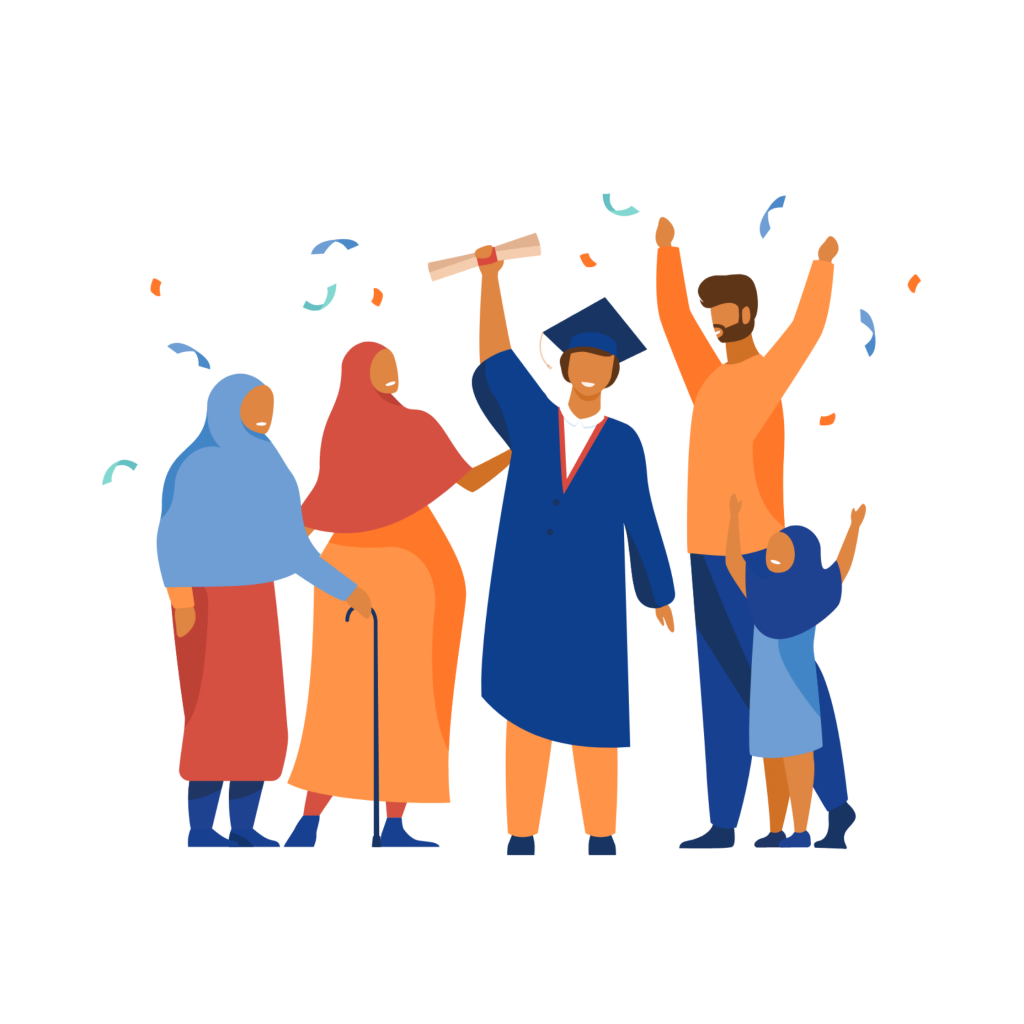
Eventually, the family becomes an integral part of their new community. As they achieve milestones in their careers, education, and personal lives, they celebrate! And we celebrate with them. For years to come, they continue progressing towards long-term goals and building relationships in the community.
Best of all, they move from being welcomed to being “welcomers” and they support other new arrivals on their refugee journey to belonging, just as people like you supported them.
Your Part in Their Journey
It is because of dedicated and compassionate people like you that families like the Ahmadis are able to rebuild their lives in a welcoming community. To find out how you can journey with families today, consider volunteering or becoming a monthly partner by joining the Path.
Read More Refugee Journey Stories
Ali’s Story: A Refugee Pharmacist Using His Career to Give Back to Others
Photo Essay: The Afghan Seamstress Sewing Beautiful Garments in Her New Community
Finally, I’m Home: Raphael’s Story of 8 Years Waiting for Resettlement
Your Family is Coming: The Long Road to Reunion for Refugees
Everyday, people like Ibrahim make the painful decision to leave their homes due to persecution, conflict, violence, human rights violations and climate-related factors. Their journeys are often marked by loss, separation and worry for those left behind.
For ten years, Ibrahim carried the weight of being separated from his family. This is his story of enduring hope.
An Impossible Decision
Ibrahim was born and raised in the Darfur region of western Sudan. He worked various jobs — housekeeping, construction, office administration — to provide for his family. He was married with three children and a fourth on the way.
While Ibrahim loved his home and community, the civil conflict left him feeling uneasy and concerned for his family’s safety.
For decades, Darfur has been embroiled in a conflict fueled by ethnic disputes and limited resources. In 2003, a rebel group launched an insurrection in Darfur, protesting what they believed was the Sudanese government’s disregard for non-Arab ethnic groups in the region. In response, the government armed ethnically Arab militias to combat rebels in Darfur.
Despite international attempts at peacebuilding and intervention, the conflict worsened. Militias threatened the lives and livelihoods of non-Arab civilians, burned down thousands of villages, committed sexual violence and blocked aid organizations from delivering much-needed food and medical supplies.
In 2013, as a renewed wave of violence gripped the region, Ibrahim made the heart-wrenching decision to flee Sudan, leaving behind his wife and children, hoping to find help.
“There was too much killing, too much fighting,” he said. “It was impossible to live.”
Seeking Safety
Ibrahim arrived in Jordan, where he had heard help was available. He registered with the U.N. High Commissioner for Refugees (UNHCR), meticulously completing his paperwork.
“I always wrote my kids’ names as my family on all the papers — all the dates of birth and everything,” Ibrahim said. He wanted to make sure records of his wife and children, still in Sudan, were included in his case so that they too would be resettled in a new country with him.
Ibrahim found work, sent money home to his family and waited.
Two years went by until one day, Ibrahim learned that his case had been approved for resettlement in the U.S. He passed all required security and health screenings, but because his family was still in Sudan, they could not travel with him.
With help from the International Organization for Migration (IOM), Ibrahim flew to the U.S. in 2016, where World Relief Triad welcomed him to North Carolina.
Ibrahim remembers feeling like he had escaped death.
“When I arrived, I was so grateful for World Relief because they helped me with everything,” Ibrahim said. “They helped me with a place to stay. They were able to find work for me, and they helped until I felt that I could do things for myself.”
And yet, as Ibrahim rebuilt his life in the U.S., he never stopped thinking of his wife and children, still stuck in Sudan. They frequently spoke over the phone — and Ibrahim continued to hope.
“I couldn’t really rest or enjoy all the blessings I had because I kept on thinking about them all the time,” Ibrahim said. “I never felt complete.”
Hoping and Waiting
Now in the U.S., Ibrahim continued working with IOM in the hopes of bringing his family to North Carolina. He was persistent, calling for updates whenever he could.
With IOM’s help, he was eventually able to secure interviews for his wife at the U.S. embassy in Khartoum, the capital of Sudan. Still, the process crept forward slowly.
Then, in 2019, just when everything finally looked ready to move forward, Ibrahim encountered another obstacle — the president of the United States announced a new executive order banning Sudanese people from traveling to the U.S., Ibrahim’s family included.
Ibrahim remembers being told, “Everything is correct; all the papers are the way they’re supposed to be. There are just some rules that they’re not allowing people.”
He began to doubt whether he would ever see his wife and children again. “I almost lost hope,” he said.
But then, in 2021, he got a call. A new U.S. presidential administration had reversed the executive order. Over the phone, he heard the long-hoped-for words: “Your family is coming.”
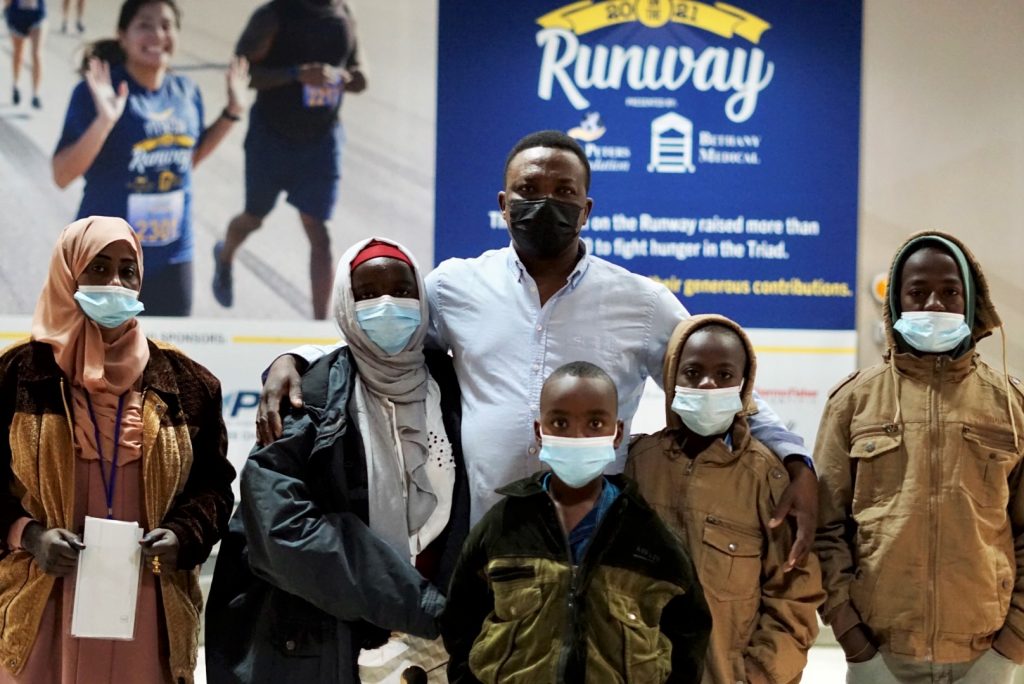
Ten years after Ibrahim had to leave his family behind in search of safety, after years of hoping and waiting, they would be reunited at last.
Reunited
In February 2022, Ibrahim gathered with staff from World Relief Triad at the airport to welcome his wife and four children to North Carolina.
“I broke down in tears because I hadn’t seen them in 10 years, and now they’re here, and it’s real,” Ibrahim said.
“The little one that I left was only three months; when he came, he was 10 years old. I cannot describe how I felt because I never thought — I was at the point of thinking maybe I will never see them again.”
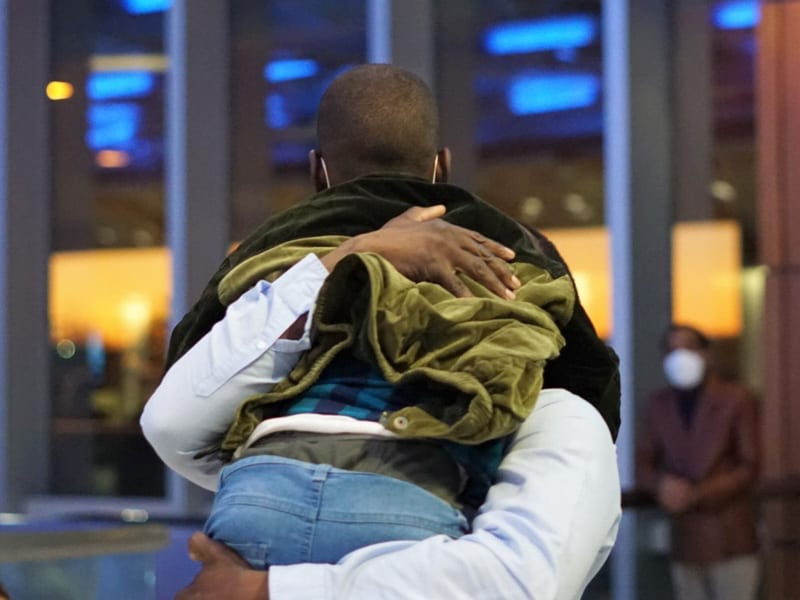
Now, with his family finally together again, Ibrahim has new hopes.
“My hopes are for my kids,” he said. “For them to get the right education, for them to be good people. I want them to make something for themselves and make me proud… for them to benefit themselves and our new country — the United States.”
Remembering Those Left Behind
Even as Ibrahim and his family continue building their new life together in the U.S., Darfur and the family, friends, and neighbors they had to leave behind are never far from his mind.
“People are really suffering there. They don’t have food, they don’t have water, they live in very unsafe, unhealthy conditions,” he said.
The UN estimates that 2.5 million people are living in displacement camps across Darfur, and 6.2 million people will need humanitarian assistance in the region within the next year. The same factors — war, violence, and persecution — that drove Ibrahim and his family from their home still impact people in Sudan today.
At World Relief, we recognize that addressing the drivers of mass displacement requires a multi-faceted and holistic response. In Sudan, World Relief is on the ground providing humanitarian assistance and investing in development and peacebuilding efforts to address the underlying factors contributing to conflict and displacement.
Building a just world means coming alongside families like Ibrahim’s once they’ve reached the U.S. and it means finding lasting solutions to the problems that force families to flee in the first place.
For Ibrahim, his hope for safety and brighter futures for those still in Darfur endures — “I really would like for them to… have a better life for themselves and for their kids.”
Together, we are taking action, hoping and praying for lasting solutions for displaced and separated families like Ibrahim’s both in the U.S. and in countries around the world.
Across the U.S., local World Relief offices rely on partners and volunteers like you to help build welcoming communities. Join them on the path to hope, transformation, and lasting change alongside refugees and immigrants like Ibrahim.

Kelly Hill serves as a Content Writer at World Relief. She previously served as Volunteer Services Manager at World Relief Triad in North Carolina before moving to Salt Lake City. With a background in International and Intercultural Communication, she is passionate about the power of story to connect people of diverse experiences.
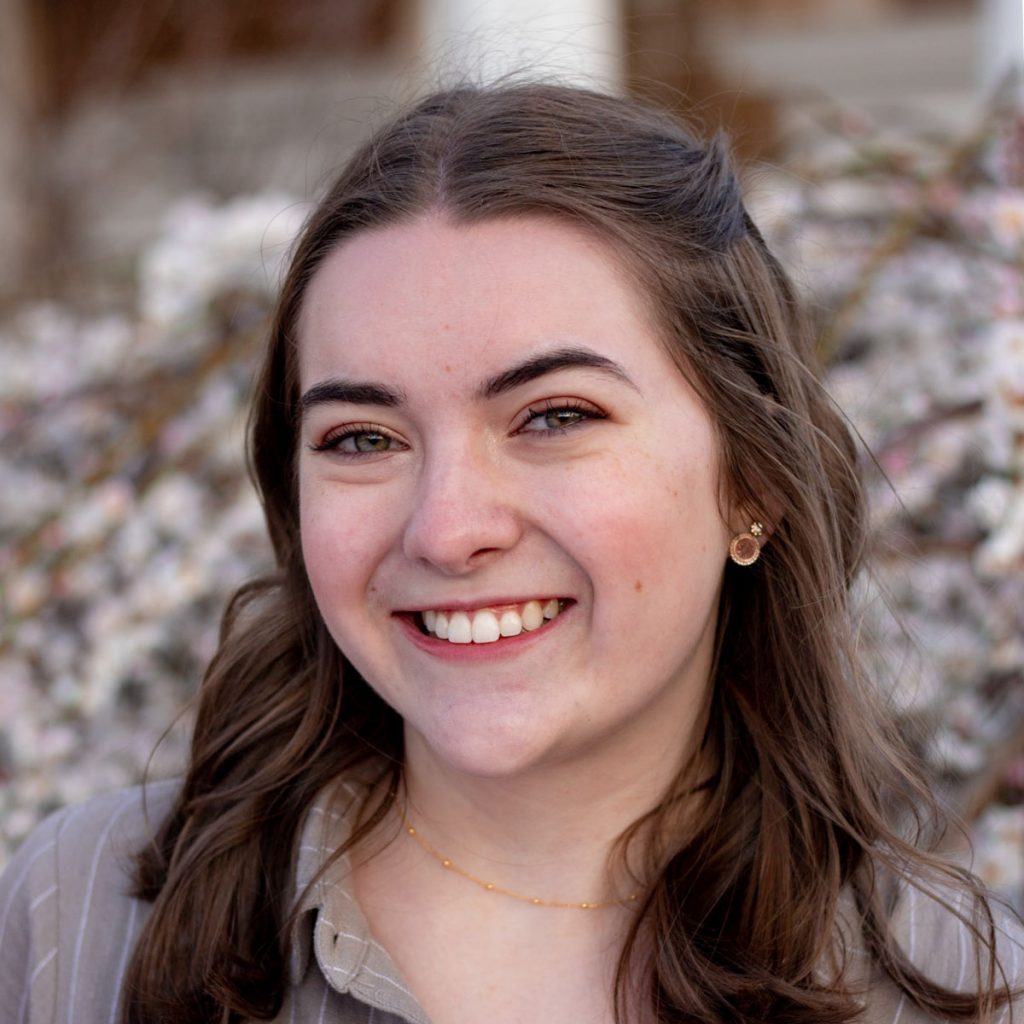
Abby Ray has been serving as the Communications & Advocacy Coordinator at World Relief’s Triad office since September 2021. She works to amplify the voices of clients, staff, and community members by empowering them to share their own stories.
Building a Community of Safety and Belonging
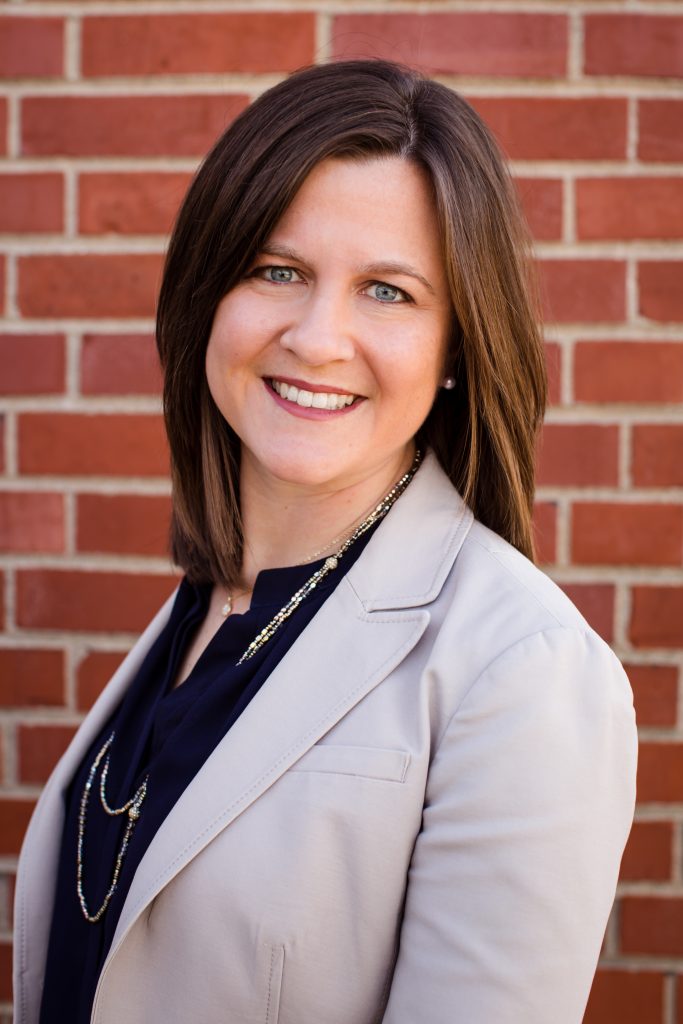
A reflection from World Relief Chicagoland Executive Director Susan Sperry.
June is World Refugee Awareness Month. And on June 20th, we celebrate World Refugee Day. This year, the theme of World Refugee Day is focused on the human right to seek safety.
Whoever they are, people forced to flee should be treated with dignity. Anyone can seek protection, regardless of who they are or what they believe. It is non-negotiable: seeking safety is a human right.
Wherever they come from, people forced to flee should be welcomed. Refugees come from all over the globe. To get out of harm’s way, they might take a plane, a boat, or travel on foot. What remains universal is the right to seek safety.
Whenever people are forced to flee, they have a right to be protected. Whatever the threat – war, violence, persecution – everyone deserves protection. Everyone has a right to be safe.
UNHCR
Who are the people seeking safety?
This is a time of visible conflicts. You might think of Ukraine. There are millions of others who have fled their homes due to less-publicized conflict in places like Ethiopia, Myanmar, or South Sudan. Many of these people become refugees. And during Refugee Awareness Month, it is important that we tell their stories of leaving home to seek refuge.
And yet there are others too – people who arrive in the United States seeking protection from violence because of their identity, religion, or views.
June is National Immigrant Heritage Month, so we also have the time to consider our immigrant neighbors who left beloved homelands, friends, and family…to seek safety and a place to live freely.
This month, I am reflecting on the key reason why both refugees and immigrants must have the right to seek safety: each one is a human being. Those of us who follow Jesus believe in the concept of the “Imago Dei”: that each person is made in the “Image of God.” Let’s explore a few reasons why that makes such an impact on how we treat our immigrant and refugee neighbors.
1. Remembering the Imago Dei Transforms Our Relationships from 2D to 3D
I recently had a conversation with a pastor about what it means to cultivate deep relationships. This pastor framed the conversation as taking a relationship from two dimensions (2D) to three dimensions (3D). By necessity, all of us have “2D” relationships. There are people we know of and we know about, but we don’t know in-depth. We know their outer image, but it’s more of a caricature. We may not think of them as a complex individual with the same level of joy, pain, and experience that we have.
A person becomes “3D” when we spend time together. By talking, laughing, eating, and being human together, we gain insight into their joys, pains, dreams, and fears. When we share life together, we become better able to see the image of God in the person before us and also recognize it within ourselves.
That’s also how we begin to understand each other’s potential. We recognize their capacity to love, create, and build relationships — and that those are qualities we share by virtue of being humans, created in the image of God.
Relationships that move from 2D to 3D begin the process of building community. And in community, where we recognize each other’s humanity, potential, and limitations, we can create safety and space for each other to thrive.
2. Developing Relationships and Belonging Requires Time
In more than 20 years with World Relief, I have seen thousands of people resettled and thousands more immigrants become a part of the World Relief community in Chicagoland. And I have experienced the many ways that being together in community is rewarding and transformative for all involved. In my friendships with immigrants and refugees like Deborah, Jerome, Mohammad, Durmomo, and many others, I have gained an appreciation for the way that the image of God manifests in the creativity, wisdom, and compassion of those around me. Keep an eye out for an upcoming blog series from my friend Durmomo about this!
In each of these friendships, investing time with each other has transformed a 2D image in my head into a 3D understanding in my heart. I am deeply grateful for how these relationships and how we continue to shape each other.
3. Our Value as Humans Gives us the Right to Seek Safety
Christianity, and many other faiths, emphasize the fact that human life is precious. This common thread across cultures is backed up in the theological belief of Christians, that humans created by God and loved by Him, are valuable and important. When someone’s life is threatened, they should have the right to seek safety so that they can experience peace, a relationship with God and others, and the opportunity to use their God-given talents and passions. As Christians, we can protect that opportunity by creating a welcoming space.
I believe that together, we can form a movement to serve the vulnerable people among us. That includes extending safety to refugees and immigrants who have fled war, violence, and persecution and allows us to see the value in every human life. We welcome them. Whoever they are, wherever they come from, and whenever they arrive.
Continue reading:
Ali’s Story: A Refugee Pharmacist Using His Career to Give Back to Others
Finally, I’m Home: Raphael’s Story of 8 Years Waiting for Resettlement
At a Well With Someone Different
June 20th is World Refugee Day. It’s a day to honor those who have been forced to flee their home countries and recognize their courage. It’s also a time to recognize the ways in which we can create opportunities for refugees and welcome them with open arms.
Honoring the vulnerable
The arrival of June brings with it a day that’s pretty important to World Relief. If you’re like I was, it might not be a day you’re particularly familiar with – but maybe if you stick around for the rest of this little article, the lack of familiarity won’t deter you from understanding the importance of World Refugee Day.
World Refugee Day (WRD) comes around every June 20th and the UNHCR (the United Nations High Commissioner for Refugees) defines it as “an international day designed by the United Nations to honor refugees around the globe.” It’s a day that’s like few others because it’s one where we not only get the chance to honor a group of people who have overcome odds we can’t even imagine, but where we also get to acquaint ourselves with people who are very different than you and I.
People who have a different cultural background than us.
People who may worship a different Deity than we do.
People who eat different foods than we do.
And that makes me think about Jesus.
Not around, but through
When we think about Jesus, so many images come to mind. Walking on water, healing the sick, and teaching the masses. Out of many images and scenes of Jesus’ life though, one that particularly stands out to me is when Jesus had a conversation with a woman at a well:
“So He came to a town of Samaria called Sychar, near the field that Jacob had given his son Joseph. Jacob’s well was there; so Jesus, wearied as he was from his journey, was sitting beside the well. It was about the sixth hour. A woman from Samaria came to draw water. Jesus said to her, ‘Give me a drink.’”
(John 4:5-7)
The story goes that Jesus was on His way to Galilee and “had to pass through Samaria.” (John 4:4) Scripture doesn’t say exactly why he had to pass through there, but what it does make clear is that Samaria was avoided as much a possible by Jews of the day. See, Jews hated Samaritans back then and Samaritans hated Jews just as much. So when we see Jesus not only pass through Samaria when He could have gone around it, but also sit down for a drink of water at a well in Samaria, we know something’s up.
The choice to walk alongside
“How is it that you, a Jew, ask for a drink from me, a woman of Samaria?”
(4:9)
You can almost feel the shock and confusion in her voice. If Jesus’ presence at a Samaritan well wasn’t enough to defy cultural barriers, his speaking to a Samaritan woman surely was. And that, I believe, was Jesus’ point.
Jesus sat down for a drink of water with someone who was different. Someone who had a different cultural background, who worshipped differently, and who lived a very different lifestyle than Him.
And that, I believe, is something World Refugee Day invites you and I into – dinner, drinks, and conversation with people who are different, and honoring them as well. On a bright, warm, June day like today I would challenge you to give it a try – I promise you won’t regret it, and it may even change another’s life (read the whole story: John 4:1-45).
Join us on World Refugee Day for a time of fellowship, devotion, and prayer – for one another, our community, and our world
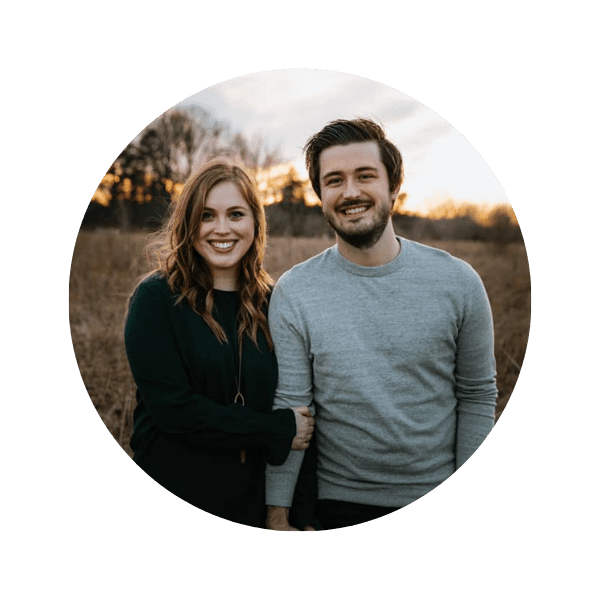
Spencer Conner is the Church Mobilizer at World Relief Quad Cities. He is originally from Atlanta, GA and has served as a Student Pastor in several churches between North Carolina and Kentucky over the past decade. Spencer is married to Beth, World Relief Quad Cities’ Community Engagement Manager, and they live in Davenport, IA with their golden retriever, Tuck.
20 Ways to Learn More About Refugees
Over the past year, crises in Afghanistan and Ukraine have reminded us of the devastating impacts of war — especially on those forced to flee their homes.
Around the world, a record breaking 100 million people have been forcibly displaced. Of those, 26.6 million are considered refugees, having fled across an international border due to war, violence, conflict or persecution. That’s millions of mothers and fathers, daughters and sons, teachers, doctors and friends — each created in the image of God — with full lives and identities long before they became refugees.
As we enter World Refugee Awareness Month and look toward World Refugee Day on June 20th, we’ve compiled a list of books, podcasts, videos and more to help answer your questions about refugees. As you engage with and share these resources, we hope you’ll be inspired to join us in creating a world where everyone can thrive.
READ
Blog: Drivers of Mass Displacement
For every 95 persons worldwide, 1 has been displaced. People are displaced from their homes for myriad reasons, including persecution, conflict, violence, human rights violations and climate-related factors. World Relief’s Lydia Dawson explains the drivers of mass displacement and how World Relief is responding globally.
Blog: Welcoming the Welcomers: One Afghan’s Journey to the U.S.
David was one of the 53,000 Afghans evacuated out of Kabul in August. He shares his story of escaping Afghanistan with his family, resettling with World Relief North Texas and the long road to rebuilding.
Book: Inalienable: How Marginalized Kingdom Voices Can Help Save the American Church
U.S. churches are at a critical crossroads — blurred lines between discipleship and partisanship have compromised our witness and confused our national and individual responses to refugees and “the stranger.” In a new book, pastor Eric Costanzo, missiologist Daniel Yang and World Relief’s Matthew Soerens find hope in the witness of global Christians, the poor and the ancient church.
Book: Beyond Welcome: Centering Immigrants in Our Christian Response to Immigration
World Relief’s Karen González, invites Christians passionate about serving immigrants to explore how we can create welcoming communities that put our immigrant neighbors at the center of the conversation. Now available for pre-order.
Book: Everything Sad is Untrue: (a true story)
Following his mother’s vocal embrace of Christianity, Daniel Nayeri, his mother and his sister were forced to flee Iran. In this memoir, he retells the tales of his family’s history from his perspective as a misfit middle schooler in Oklahoma.
Book: The Girl Who Smiled Beads
When Clementine was six years old, she and her 15-year-old sister, Clair, fled the massacre that was happening in their home country of Rwanda. In this riveting memoir, Clementine tells their story of rebuilding and reclaiming life on their own terms.
Book: On the Other Side of the Sky
After stepping on a landmine and narrowly escaping death, Farah Ahmedi fled her home country of Afghanistan with her family and resettled in the U.S. Today, Farah is a writer, mother, speaker, humanitarian and activist. She tells her story in this remarkable memoir.
LISTEN
This World Relief mini-series offers a global and a biblical perspective on the subjects of immigration, mass displacement and refugee resettlement, diving into current policies and practices and sharing stories of our collective human experience.
Podcast: Working a Refugee Crisis: Jordan
In 2011, civil war broke out in Syria resulting in the largest refugee crisis since World War II. In this six-episode series, hear conversations from refugees, locals, relief workers and aid agencies who responded to the crisis in Jordan and gain a deeper understanding of the refugee crisis.
This six-part series traces the U.S. refugee resettlement journey through the eyes of those directly experiencing it. Follow along as each episode brings the listener into the daily lives of refugees adjusting to life in the U.S.
Podcast Episode: Learn and Pray Together for Ukraine with Jenny Yang
Crises like the war in Ukraine can feel overwhelming. In this podcast episode, Jamie Ivey talks with World Relief’s Jenny Yang about practical ways Christians can respond through prayer, advocacy and action.
WATCH
TEDxTalk: One Refugee’s Life Experience | Come Nzibarega
Born and raised in Burundi, Come Nzibarega shares his story of escaping torture and civil war. Today, Come works as an Employment Specialist for World Relief. Hear more of his story and hear why Come thinks refugee camps are the richest places in the world.
After 8 years in a Refugee camp, Raphael arrived in the United States and was welcomed by World Relief volunteers. Now, he works on staff with World Relief in North Carolina. In this short video, he shares his resettlement journey.
Video: Who are Refugees and How Do They Arrive in the United States?
From flight and displacement to arrival and integration, this 7-minute animated video tells the true story of a refugee family’s experience in each stage of the refugee resettlement process.
STUDY
World Relief Workshop Course: Navigating Friendships
Navigating friendships with those who are different from us can be rewarding — and challenging! In this self-paced, online course you’ll learn essential skills for building empowering, long-lasting friendships with those who may differ from you in culture, socioeconomic status and religion, and best practices for supporting a friend who lives with trauma. Now through June 30, enroll for 50% off with code WORLDREFUGEEDAY50.
World Relief Workshop Course: Afghan Culture Guide
Welcoming newcomers comes with both joys and challenges as we navigate cross-cultural relationships. The Afghan Culture Guide is an interactive, online course that provides essential knowledge about Afghan culture, helps unpack common tension points and provides practical tools to move you towards a mutually enriching friendship with your Afghan neighbors. Now through June 30, enroll for 50% off with code WORLDREFUGEEDAY50.
Our culture is flooded with thoughts and opinions on people who leave their homes and immigrate to the U.S. — but what does the Bible have to say about migration? Journey deeper into God’s redemptive story of migration and discover his heart for refugees, immigrants and the displaced in this free, six-week study from our partners at Women of Welcome.
Bible Reading Plan: The I Was a Stranger Challenge
Take the challenge and discover God’s heart for those who have been displaced. Over the course of 40 days, read one Bible passage a day that speaks to God’s love for foreigners and refugees.
FOR THE WHOLE FAMILY
Women of Welcome Family Toolkit
Do you wish you could talk with your kids or teenagers about immigration but aren’t sure how? This toolkit makes it simple and fun to invite your family to engage in positive conversations on hospitality and immigration through scripture reading, discussion questions, coloring pages, prayer journal pages, book recommendations and more.
For parents and teachers struggling to know how to talk about mass displacement with children and teens, the UN Refugee Agency offers teaching materials on refugees, asylum and migration, as well as guidance for teachers working with refugee children in the classroom.
Want to keep learning? Stay informed about refugee resettlement and World Relief’s work to care for those in vulnerable situations around the world by signing up for our monthly email newsletter.

Karen Spencer is World Relief’s U.S. Marketing Partner and serves U.S. offices in the area of identity and messaging. She previously served as Mobilization Director for World Relief in Memphis, where she lives. She is a connector of people, places, passions and purpose.

Kelly Hill serves as a Content Writer at World Relief. She previously served as Volunteer Services Manager at World Relief Triad in North Carolina before moving to Salt Lake City. With a background in International and Intercultural Communication, she is passionate about the power of story to connect people of diverse experiences.
Graduating With a New Perspective
More than a skillset
Looking back on the last year I have spent interning with World Relief Quad Cities, I am so grateful for all the opportunities and the people I’ve met as a Communications intern.
This internship was exactly what I wanted and then some, as I was able to hone my skills in communications and journalism while writing some of the most meaningful and impactful stories I may ever write.
It’s been wonderful to work with so many great people in the World Relief organization and to make so many great and hopefully long-lasting connections as I continue on into my post-college journey.
My internship at World Relief has not only opened up my eyes to the Quad Cities community, but to the world as well. I was fortunate enough to interview many fascinating and inspiring people within the Quad Cities area that made me excited to write their stories and feature them in each month’s newsletter.
I have also gained a greater understanding of the world and the many cultures that I had time to get to know and interact with while writing these stories. It helped me realize even more how important it is to engage within one’s community and also with other cultures, and to share acts of kindness, no matter how big or small, in hopes of inspiring others to do the same.
Looking toward the future
As for me, I graduated from Augustana College with my bachelor’s degree in Multimedia Journalism and Mass Communications in May. I’m beginning my journalism career working as a weekend producer at KWQC in Davenport, as well as working on the production team for the Quad Cities River Bandits this season.
I’m excited for what the future holds in my post-college career, andI know I will always fondly remember my time at World Relief QC. I’m so grateful for how it has helped to sharpen my journalism skills and become more educated on the world, world cultures, and the Quad Cities community.
Thank you World Relief, and to all those that have made my time here so worthwhile and memorable!
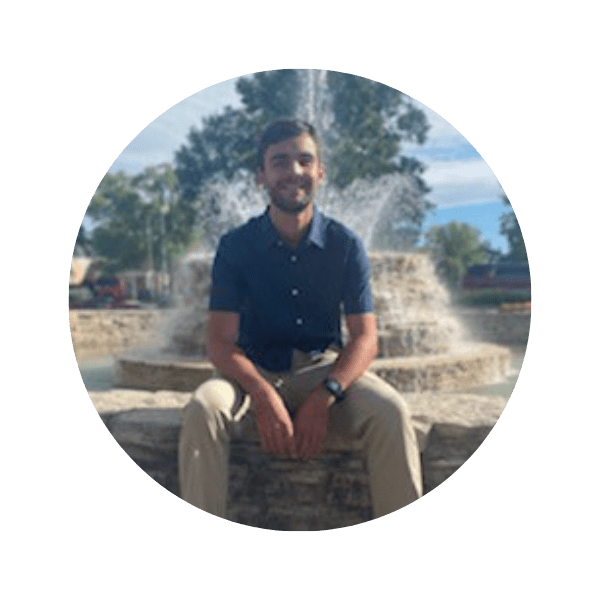
Brady Johnson is a senior at Augustana College studying multimedia journalism and mass communications. He’s currently interning in Communications with World Relief Quad Cities, and hopes to be part of something greater than himself.
20 Ways to Learn More About Refugees
Over the past year, crises in Afghanistan and Ukraine have reminded us of the devastating impacts of war — especially on those forced to flee their homes.
Around the world, a record breaking 100 million people have been forcibly displaced. Of those, 26.6 million are considered refugees, having fled across an international border due to war, violence, conflict or persecution. That’s millions of mothers and fathers, daughters and sons, teachers, doctors and friends — each created in the image of God — with full lives and identities long before they became refugees.
As we enter World Refugee Awareness Month and look toward World Refugee Day on June 20th, we’ve compiled a list of books, podcasts, videos and more to help answer your questions about refugees. As you engage with and share these resources, we hope you’ll be inspired to join us in creating a world where everyone can thrive.
READ
Blog: Drivers of Mass Displacement
For every 95 persons worldwide, 1 has been displaced. People are displaced from their homes for myriad reasons, including persecution, conflict, violence, human rights violations and climate-related factors. World Relief’s Lydia Dawson explains the drivers of mass displacement and how World Relief is responding globally.
Blog: Welcoming the Welcomers: One Afghan’s Journey to the U.S.
David was one of the 53,000 Afghans evacuated out of Kabul in August. He shares his story of escaping Afghanistan with his family, resettling with World Relief North Texas and the long road to rebuilding.
Book: Inalienable: How Marginalized Kingdom Voices Can Help Save the American Church
U.S. churches are at a critical crossroads — blurred lines between discipleship and partisanship have compromised our witness and confused our national and individual responses to refugees and “the stranger.” In a new book, pastor Eric Costanzo, missiologist Daniel Yang and World Relief’s Matthew Soerens find hope in the witness of global Christians, the poor and the ancient church.
Book: Beyond Welcome: Centering Immigrants in Our Christian Response to Immigration
World Relief’s Karen González, invites Christians passionate about serving immigrants to explore how we can create welcoming communities that put our immigrant neighbors at the center of the conversation. Now available for pre-order.
Book: Everything Sad is Untrue: (a true story)
Following his mother’s vocal embrace of Christianity, Daniel Nayeri, his mother and his sister were forced to flee Iran. In this memoir, he retells the tales of his family’s history from his perspective as a misfit middle schooler in Oklahoma.
Book: The Girl Who Smiled Beads
When Clementine was six years old, she and her 15-year-old sister, Clair, fled the massacre that was happening in their home country of Rwanda. In this riveting memoir, Clementine tells their story of rebuilding and reclaiming life on their own terms.
Book: On the Other Side of the Sky
After stepping on a landmine and narrowly escaping death, Farah Ahmedi fled her home country of Afghanistan with her family and resettled in the U.S. Today, Farah is a writer, mother, speaker, humanitarian and activist. She tells her story in this remarkable memoir.
LISTEN
This World Relief mini-series offers a global and a biblical perspective on the subjects of immigration, mass displacement and refugee resettlement, diving into current policies and practices and sharing stories of our collective human experience.
Podcast: Working a Refugee Crisis: Jordan
In 2011, civil war broke out in Syria resulting in the largest refugee crisis since World War II. In this six-episode series, hear conversations from refugees, locals, relief workers and aid agencies who responded to the crisis in Jordan and gain a deeper understanding of the refugee crisis.
This six-part series traces the U.S. refugee resettlement journey through the eyes of those directly experiencing it. Follow along as each episode brings the listener into the daily lives of refugees adjusting to life in the U.S.
Podcast Episode: Learn and Pray Together for Ukraine with Jenny Yang
Crises like the war in Ukraine can feel overwhelming. In this podcast episode, Jamie Ivey talks with World Relief’s Jenny Yang about practical ways Christians can respond through prayer, advocacy and action.
WATCH
TEDxTalk: One Refugee’s Life Experience | Come Nzibarega
Born and raised in Burundi, Come Nzibarega shares his story of escaping torture and civil war. Today, Come works as an Employment Specialist for World Relief. Hear more of his story and hear why Come thinks refugee camps are the richest places in the world.
After 8 years in a Refugee camp, Raphael arrived in the United States and was welcomed by World Relief volunteers. Now, he works on staff with World Relief in North Carolina. In this short video, he shares his resettlement journey.
Video: Who are Refugees and How Do They Arrive in the United States?
From flight and displacement to arrival and integration, this 7-minute animated video tells the true story of a refugee family’s experience in each stage of the refugee resettlement process.
STUDY
World Relief Workshop Course: Navigating Friendships
Navigating friendships with those who are different from us can be rewarding — and challenging! In this self-paced, online course you’ll learn essential skills for building empowering, long-lasting friendships with those who may differ from you in culture, socioeconomic status and religion, and best practices for supporting a friend who lives with trauma. Now through June 30, enroll for 50% off with code WORLDREFUGEEDAY50.
Our culture is flooded with thoughts and opinions on people who leave their homes and immigrate to the U.S. — but what does the Bible have to say about migration? Journey deeper into God’s redemptive story of migration and discover his heart for refugees, immigrants and the displaced in this free, six-week study from our partners at Women of Welcome.
Bible Reading Plan: The I Was a Stranger Challenge
Take the challenge and discover God’s heart for those who have been displaced. Over the course of 40 days, read one Bible passage a day that speaks to God’s love for foreigners and refugees.
FOR THE WHOLE FAMILY
Women of Welcome Family Toolkit
Do you wish you could talk with your kids or teenagers about immigration but aren’t sure how? This toolkit makes it simple and fun to invite your family to engage in positive conversations on hospitality and immigration through scripture reading, discussion questions, coloring pages, prayer journal pages, book recommendations and more.
For parents and teachers struggling to know how to talk about mass displacement with children and teens, the UN Refugee Agency offers teaching materials on refugees, asylum and migration, as well as guidance for teachers working with refugee children in the classroom.
Want to keep learning? Stay informed about refugee resettlement and World Relief’s work to care for those in vulnerable situations around the world by signing up for our monthly email newsletter.

Karen Spencer is World Relief’s U.S. Marketing Partner and serves U.S. offices in the area of identity and messaging. She previously served as Mobilization Director for World Relief in Memphis. She is a connector of people, places, passions and purpose.

Kelly Hill serves as a Content Writer at World Relief. She previously served as Volunteer Services Manager at World Relief Triad in North Carolina before moving to Salt Lake City. With a background in International and Intercultural Communication, she is passionate about the power of story to connect people of diverse experiences.
A Journey to Lasting Peace
How one mother led her family toward flourishing amidst war, violence, and poverty.
Claudine Furaha knows well the joys and challenges that motherhood brings. Being a mother of five children, and having grown up in the Democratic Republic of the Congo, located in Central Africa, she is an amazing woman, full of hope, joy, and personality.
Life in the DRC
Claudine and her family spent most of their lives around war and poverty. Claudine told us that “life in the Congo was very bad.” Decades of war, violence, and poverty in the Congo have claimed many lives, while displacing and endangering thousands of others. Few have been unscathed, including Claudine.
In 2021, Claudine was shot twice — once in the back and once in the hand. She was immediately taken to a hospital with severe injuries. Upon arrival, she was informed that they did not have the proper medicine to treat her. Claudine received this same message at multiple hospitals until finally being told that the U.S. would have the medicine needed to help her. So, in October 2021, she and her family journeyed to Texas, where they were resettled by World Relief North Texas.
A New Home
Once in the U.S., Claudine was able to get her wounds treated and her family paired with a World Relief caseworker, Taylor. Taylor helped ensure that Claudine and her family had everything they needed during their initial months of resettlement: from an apartment to live in, furniture, how to grocery shop in the U.S., and so much more. “World Relief does good work,” Claudine says. “Taylor helped us with so many things, and she also took us to do things outside of World Relief. She took us to have fun. I love Taylor like my own family and Taylor loves us.” Taylor took Claudine and her family on night drives in downtown Fort Worth to see the lights on the buildings and invited them to Christmas services at her church. She invited them to be a part of her life.
Taylor has been personally impacted by the strength and joy of Claudine and her family. It was sweet to hear Claudine reflect on how World Relief and her case worker set her up to live successfully in the U.S. by using the skills and strengths she already possessed.
Finding Peace
When we asked Claudine to reflect on how her life has changed while living in the U.S., she happily reported that the good far outweighs the bad in her life. “I have found peace here,” she says. Most notably, her children now have the opportunity to go to school, as schooling was not something they could afford in the Congo. As a mother, she is most happy that her children will now have an education.
Self-Sufficient and Strong
Claudine is working hard to learn English herself, and is an example for her children of how to work hard and integrate into life in the U.S. Claudine loves her ESL classes, and every week she arrives with a face beaming of joy and excitement to learn. She and her family are learning how to be self-sufficient and strong. In the future, she is hopeful that she and her children will be able to adjust from the hardships of their past and live an amazing life.
As a mother, she not only exemplifies strength, grace, and love to her children, but the spirit of a life-long learner. Claudine Furaha is an amazing example to her children of how to remain strong no matter the circumstance. We thank the Lord for strong mothers in our lives, like Claudine.
What is Our Response?
We are called to show the love of Christ by helping displaced women just like Claudine. Whether we are caring for their physical needs, like Taylor, befriending them, like a Good Neighbor Team, or simply praying and giving; we are called to join in.
Learn HERE how you can be a part of supporting and serving the most vulnerable in North Texas.
Reflections on Motherhood, Privilege and War
This afternoon my husband built our son a playhouse. Ten minutes was all it took to assemble the basic sand-colored canvas, another ten to fill it with plush blankets and toys. As the sun streamed through our living room window and my husband marveled at the safe, sweet little space he’d built for our son, I thought of Ukraine.
How many millions of families would wish right now for that safe little canvas playhouse, assembled in more time than it took Putin to turn their homes to rubble? I wonder what they chose to take with them in those ten minutes, as they pulled their babies from their beds and fled.
Viewing war and suffering through the lens of motherhood is a new experience for me. It’s raw and visceral and hard. So much harder than before. I feel connected to the millions of women fleeing Ukraine in ways I’ve never before felt. An experience, it seems, that is clearly felt by mothers all over the world as we hear about women like Lubomira, who fled Ukraine with her three daughters and three-week-old, premature son, leaving behind her husband to the mandated military conscription.
The plight of these women is almost incomprehensible to me. And it’s brought me to tears again and again as I sit with my baby boy.
As I feed him, I think of the children in Mariupol, who have been cut off from food, clean water and basic necessities for weeks.
As I rock him to sleep to sweet lullabies in his nursery, I think of the babies lining the floors of loud, overcrowded bomb shelters.
As I watch his daddy play with him, I think of all the fathers left behind. The women and children who have lost their partners and protectors during the scariest time of their lives. I think about the fact that 90% of the 4.3 million refugees are women and children without husbands and fathers — a million families separated.
Truly, I cannot comprehend the fear, the pain and the suffering. In these moments, I’ve cried out to God for mercy. Lord, what can we do?
It’s easier to shut it out. To turn it off when it all gets too much. When the headlines and images become unbearable. But then I remember, the mothers of Ukraine can’t do the same.
They can’t turn off the bombings, the sirens or the shouts of Russian soldiers. They can’t turn off the cries of their babies, their growling stomachs, their chattering teeth. They can’t distract from the knot in their throat, the pit in their stomach. They don’t get to switch the channel.
And so, nor will I.
I will bear witness to this moment. I will feel it all. I will ask God for the courage not to look away. And I will remember it’s hard for a reason. The pain in my chest. The nausea in my stomach. The knot in my throat. It’s there as a reminder that we’re not meant to shut off from the suffering of humanity. It’s our hearts, our souls, our bodies, telling us to act. To do something, anything, to help.
Will you join me in praying for the mothers of Ukraine, and the millions of mothers caught up in war and violence around the world today?
Lord,
Thank you for the extraordinary gift of motherhood. Thank you for the way it connects us, transcending culture, geography and time in its shared experience. Thank you that in times like these, it draws out the very best of our instincts to love and support. Thank you that in mothers you created a superhuman strength, one that can come only from you. Grant all of us the grace to channel this type of strength.
Lord, today we see this strength in the mothers of Ukraine. We cry out for your loving protection. We ask that you embrace these mothers in your arms of tender care. Guard them and pour upon them your comfort and strength. Give them the stamina to survive the pain and despair this war has brought. Remind them, Lord, that you have not forsaken them nor abandoned them, even in their darkest hour. Give them the words to comfort their children, and one another, as they are separated from their families by distance or death. Bless them with a peace that surpasses understanding, and remind them of your love for them each and every day.
God, we pray this prayer today not only for the mothers of Ukraine, but for all mothers caught up in war and violence around the world today. Place their hope in you Lord, so that it might renew their strength. Allow them to run and not grow weary, walk and not be faint. Pour out your love and peace upon them, Lord God, on this Mother’s Day, and every day.
In your name we pray,
Amen.
If you are praying for ways to act in welcome and solidarity with displaced mothers, consider volunteering with us. Learn more here.

Francesca Albano currently serves as Director of Branded Content at World Relief. With a background in Cultural Anthropology and a graduate degree in Strategic Marketing Communications, she connects her interests in societal studies and global cultures with her training in brand strategy and storytelling. Francesca is especially passionate about grassroots community development and the treatment and advancement of women and girls around the world.
How You Can Lead from Where You Are

Leadership reflection from World Relief Chicagoland Executive Director Susan Sperry.
At World Relief, we regularly say that we want to create communities of love and welcome. I believe that this is an important vision. In fact, it’s a guiding idea that has motivated much of my own decision-making and sense of calling in my life and career spent serving at World Relief. And I think this vision reflects beautiful biblical values that remind us of God’s heart for how Christians can engage with immigrants and refugees.
“For I was a stranger, and you welcomed me,” Jesus tells us in Matthew 25:35.
Yet as I ponder this vision and what it looks like practically for each of us, there is a quote from Dietrich Bonhoeffer that challenges the way I apply this vision to my life and thinking.
“The person who loves their dream of community will destroy community, but the person who loves those around them will create community.”
― Dietrich Bonhoeffer, Life Together: The Classic Exploration of Christian Community
When we put these wise words in conversation with our vision to create communities of love and welcome, I believe we are left with an invitation: an invitation to lead and to steward.
Leadership & Stewardship
Bonhoeffer gives us a “reality check” opportunity by reminding us that our big, inspirational ideas about what community should look like matter far, far less than how we actually treat those around us. Building community is not about the headline moments, but more about small, faithful actions to serve those around us. Instead, what if we complete many small actions to serve those around us?
World Relief’s mission is to equip the Church, as well as like-minded community members, to serve those in vulnerable situations. And this is a strength, I believe, because it means we open doors for you to lead from where you are. And that is an invitation to stewardship. Stewardship of relationships, time, finances, and even opportunities. That is why, when World Relief asks you to consider what you can do to help create welcoming communities, we believe that response varies person by person. And we each have a role to play!
People Leading in their Sphere
Every day, I’m amazed at the creative ways that members of my community step up in leadership. For some, this can be a bold step of faith to do something new. For others, it’s using the platform or position they have been given. I’m inspired by leaders young and old from all walks of life who choose to be part of a change.
We’ve seen…
- Sunday school teachers leading from Scripture with lessons about God’s heart for immigrants and refugees
- College students organizing their friends on campus to write letters to political representatives to advocate for DACA recipients
- Children running lemonade stands to raise funds for their new neighbors from Afghanistan.
- Refugees welcomed by World Relief returning as volunteers to help others
- Individuals researching the needs of immigrants in Chicago so that they can give strategically
- Groups from local churches coming together to form a team to walk alongside a recently-arrived refugee family
- And so many others!
Each of these examples became part of creating a community of love and welcome. And they did it by asking a question.
“What does it look like to faithfully serve those around me? How can I lead by serving the people who are my neighbors?”
Our Call
I want to challenge each of us to think about leadership not only as a position. Instead, as an invitation that anyone can accept.
With that mindset in place, what if we asked ourselves, “What does it mean for me to lead in creating lasting change where God has me right now?”
Continue Reading
Partner Spotlight: Greg & Olivia Evans on “Who is my neighbor?”
Video: We Believe the Church Can Change the World
A Reflection During Volunteer Appreciation Month










